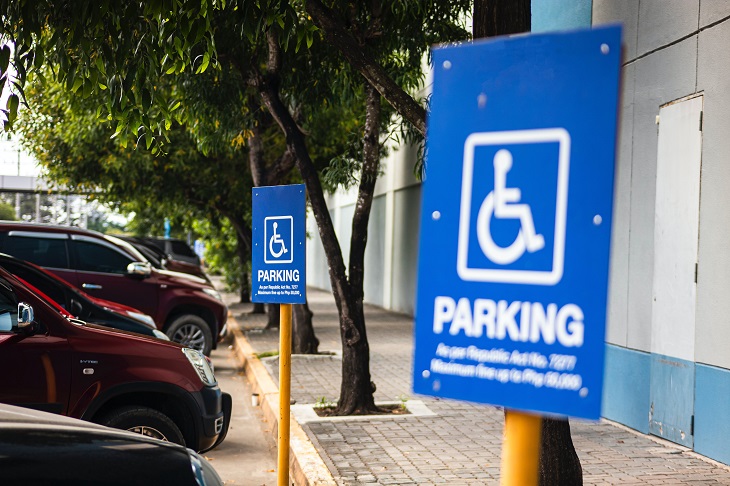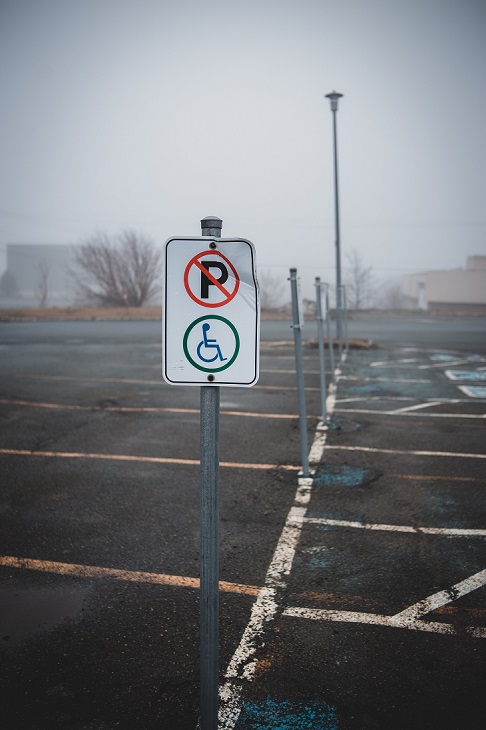In the intricate tapestry of post-service life, veterans with disabilities face unique challenges, and navigating the landscape of handicap parking is a significant aspect of their daily journey. Handicap parking spaces are not just painted rectangles; they represent access, independence, and inclusivity.
This guide will take you through the myriad benefits available to veterans, shedding light on the resources and privileges that can make a substantial difference in their lives. Whether you’re looking for insight into anything from Pennsylvania veteran parking benefits, to Michigan veteran handicap parking rules, to getting a Texas disabled parking permit for veterans, we’ve got you covered!
Understanding the Spectrum of Disabilities Among Veterans
Before immersing ourselves in the multifaceted realm of handicap parking benefits, it is imperative to acknowledge the diverse range of disabilities that veterans might encounter. Whether grappling with physical impairments resulting from combat injuries or contending with the intricacies of mental health conditions like post-traumatic stress disorder (PTSD), veterans traverse a spectrum of challenges that can profoundly impact their daily lives.
Veterans may face a spectrum of disabilities resulting from their military service, and these can significantly impact their mobility and daily lives. Physical disabilities, often incurred through combat injuries or service-related accidents, may range from limb loss to chronic pain, affecting a veteran’s ability to move freely. Traumatic brain injuries (TBIs) can also impact coordination and balance, adding an additional layer of complexity to mobility challenges. Furthermore, veterans may grapple with invisible disabilities, such as post-traumatic stress disorder (PTSD) or other mental health conditions, which can heighten anxiety in public spaces and make navigating crowded areas more challenging. The amalgamation of these physical and mental health challenges underscores the diverse and complex nature of disabilities among veterans, emphasizing the crucial need for accessible infrastructure and support systems to facilitate their mobility and integration into civilian life.
The Significance of Accessible Parking
Accessible parking spaces are crucial facilitators in the quest for inclusivity, providing veterans with disabilities a gateway to essential services and amenities. The importance of disabled parking for veterans cannot be overstated, as it serves as a tangible means of recognizing and addressing the unique challenges they may face due to their military service.
Disabled parking spaces are strategically designed to facilitate easier access for individuals with mobility challenges, allowing veterans to navigate their daily lives with greater independence. These specially designated spaces, strategically located for convenience, are designed with wider dimensions, easing the ingress and egress for wheelchair users. Proximity to building entrances further diminishes the travel distance for those with mobility challenges, fostering an environment of accessibility and equal opportunity.
For veterans with physical disabilities resulting from combat injuries or service-related incidents, these designated parking spaces significantly reduce the physical strain associated with accessing public spaces. Moreover, for veterans contending with invisible disabilities such as post-traumatic stress disorder (PTSD), having access to disabled parking can alleviate the stress and anxiety often triggered by crowded or unfamiliar environments.
Beyond mere convenience, disabled parking spaces symbolize a societal commitment to honoring and supporting those who have sacrificed for their country, acknowledging that their unique needs deserve accommodation and respect. Providing veterans with accessible parking not only enhances their mobility but also fosters a sense of inclusion and gratitude, recognizing their service and ensuring they can fully participate in and contribute to civilian life.
Federal Legislation: A Foundation for Equality
At the federal level, legislation stands as a stalwart guardian of veterans’ rights, ensuring that they have not only a seat at the table but also a space in the parking lot. The Americans with Disabilities Act (ADA) stands as a beacon of inclusivity, vehemently opposing discrimination against individuals with disabilities. This landmark legislation mandates that parking facilities reserve a specific percentage of spaces for individuals with disabilities, extending its protective umbrella, encompassing veterans in its provisions. In general, veterans’ rights when it comes to parking will be similar from state to state – Florida disabled veteran parking benefits will likely be pretty similar to Washington State disabled veteran parking privileges. However, there are various different requirements and processes between states, which we’ll cover below.
State-Level Benefits: Tailoring Support to Individual Needs
While federal legislation forms the bedrock, individual states weave their own tapestries of support for veterans. State-specific benefits augment federal provisions, offering specialized programs and resources that cater to the unique needs of veterans with disabilities.
One such avenue is the provision of distinctive license plates or placards, an emblem of recognition and support for veterans. These state-specific markers not only grant access to designated handicap parking spaces but also serve as a visible reminder of the nation’s gratitude for their service.

Understanding Disabled Veteran License Plates and Placards
Central to the discourse on handicap parking benefits for veterans are disabled veteran license plates and placards. These specialized identifiers, issued by state departments of motor vehicles, unlock a myriad of advantages for veterans:
- Designated Parking Spaces: Disabled veteran license plates and placards ensure that veterans have access to parking spaces strategically placed for optimal convenience.
- Exemption from Fees: In many states, vehicles adorned with disabled veteran plates or placards enjoy exemptions from parking fees, alleviating financial burdens for veterans navigating life with disabilities.
- Extended Parking Time: Recognizing that individuals with disabilities may require additional time for daily activities, some states grant vehicles with disabled veteran plates or placards extended parking durations, providing flexibility and convenience.
Veterans in the United States have access to different types of disabled parking permits designed to cater to their specific needs. One common form is the disabled veteran license plate, which is affixed to the veteran’s vehicle. These license plates not only serve as a visible identifier of the veteran’s service but also grant special parking privileges, typically in designated handicap spaces. These privileges are generally similar nationwide – a California disabled veteran license plate will provide similar benefits to a Georgia veteran license plate for handicap parking.
Veterans may also (or in addition) obtain a disabled veteran parking placard, a portable permit that can be displayed in any vehicle they are using. This offers flexibility, allowing veterans to benefit from handicap parking spaces regardless of the vehicle they are driving. Again, placards provide similar benefits throughout the country; if you have a New York veteran handicap parking placard, you’ll be entitled to similar benefits as someone using the Massachusetts veteran handicap parking program, and so on.
Disabled veteran license plates and parking placards are often distinguished by unique designs, making them easily recognizable by law enforcement and parking attendants. Both forms of permits contribute to a more accessible and inclusive environment for veterans with disabilities, enhancing their mobility and overall quality of life.
Eligibility Criteria: Navigating the Path to Benefits
The journey to handicap parking benefits for veterans is paved with specific eligibility criteria, ensuring that these privileges are directed towards those who need them the most. Key eligibility considerations include:
Service-Connected Disability
Veterans seeking disabled veteran plates or placards must demonstrate a service-connected disability, establishing a direct link between their condition and their military service. These disabilities may vary widely, as they encompass both physical and mental health conditions resulting from military service.
Some examples of service-connected disabilities that could make a veteran eligible for disabled parking access include:
- Amputation or Limb Loss: Veterans who have lost a limb or experienced amputation due to combat injuries or accidents during their service may qualify for disabled parking access.
- Orthopedic Injuries: Musculoskeletal injuries, including severe fractures, joint injuries, or chronic pain resulting from military service, can impact a veteran’s ability to walk and navigate public spaces comfortably.
- Traumatic Brain Injury (TBI): Veterans who have sustained a traumatic brain injury during their service may experience challenges related to mobility, coordination, and balance.
- Post-Traumatic Stress Disorder (PTSD): While not visible, the mental health impact of PTSD can significantly affect a veteran’s ability to cope with crowded or stressful environments, warranting consideration for disabled parking access.
- Spinal Cord Injuries: Injuries affecting the spinal cord, resulting in paralysis or impaired mobility, can make veterans eligible for disabled parking privileges.
- Chronic Pain Disorders: Veterans experiencing chronic pain conditions related to their military service, such as back pain or neuropathy, may qualify for disabled parking access.
- Loss of Vision or Hearing: Veterans with service-connected vision or hearing loss may face challenges in navigating public spaces, justifying the need for disabled parking accommodations.
Percentage of Disability
States often stipulate a minimum percentage of disability determined by the Department of Veterans Affairs (VA). This percentage serves as a yardstick for the severity of the disability.
Application Process
Veterans must engage in a structured application process through their state’s department of motor vehicles, providing documentation from the VA to substantiate their service-connected disability. Applications can differ from state to state – the North Carolina disabled veteran placard application process may not be exactly the same as the process for Missouri veteran handicap parking application, so it’s important to check your state’s requirements. We’ll delve into some further information about application processes below.
Renewal Procedures
To ensure the continuity of benefits, disabled veteran plates or placards may have expiration dates. The duration of validity for veteran disabled parking permits can vary depending on the state and the specific type of permit issued. In many states, disabled parking permits for veterans are generally valid for a specified period, often ranging from six months to several years. However, it’s crucial to note that these durations may be subject to renewal. Veterans with service-connected disabilities must typically reapply for the disabled parking permit before the expiration date.
The renewal process ensures that the veteran’s medical condition is reassessed, and the continued need for disabled parking accommodations is verified. The Department of Motor Vehicles (DMV) or the relevant state agency usually provides clear instructions on the renewal procedure, including any required documentation.
Veterans should carefully review the guidelines provided by their state’s DMV to understand the specific validity period for disabled parking permits and the steps involved in the renewal process. The Arizona disabled veteran license plate renewal process may differ from Wisconsin veteran parking placard renewal, which again may differ from the process for Illinois disabled veteran license plate renewal! Staying informed on your state’s process and proactively managing the renewal of disabled parking permits ensures that veterans with service-connected disabilities can continue to access the essential benefits provided by these permits.

How to Get a Handicap Parking Permit as a Veteran
In the United States, veterans seeking a disabled parking permit can follow a structured process to obtain the necessary accommodations. The primary avenue is through the Department of Motor Vehicles (DMV) or an equivalent state agency, where veterans can apply for a disabled parking permit or license plates. As mentioned above, eligibility typically hinges on having a service-connected disability, and veterans must provide documentation from the Department of Veterans Affairs (VA) confirming the nature and extent of their disability.
Application forms are available through the DMV, and the submission process may require medical documentation, details about the service-connected disability, and personal information. Once approved, veterans can receive either a disabled parking placard or specialized license plates.
As we’ve mentioned, it’s crucial for veterans to be aware of the specific criteria and application procedures in their respective states, as they may vary. The Maryland disabled veteran license plate process won’t be exactly the same as the one for accessing Tennessee veteran license plate handicap parking, so it’s important to investigate in your particular state. Seeking assistance from veterans’ service organizations or support networks can also be beneficial in navigating the application process successfully.
Challenges and Advocacy: Paving the Way for a Supportive Environment
Despite the availability of benefits, challenges persist in the realm of handicap parking for veterans. A lack of awareness among veterans, the general public, and even law enforcement can lead to misunderstandings or misuse of handicap parking spaces.
In addressing these challenges, advocacy emerges as a potent tool. Organizations dedicated to veterans’ rights and disability advocacy can play a pivotal role in raising awareness about accessible parking and the specific benefits available to veterans. Outreach efforts become instrumental in informing veterans about their eligibility for disabled veteran plates or placards, ensuring that these resources are utilized to their full potential.
***
Accessible parking serves as a linchpin in the broader framework of support for veterans with disabilities, offering a tangible pathway to independence and inclusion. Federal legislation, complemented by state-specific programs and the availability of disabled veteran license plates or placards, collectively contribute to creating an environment where veterans can navigate their post-military lives with dignity and ease.
As veterans embark on the journey of accessing handicap parking benefits, understanding eligibility criteria, application processes, and renewal procedures becomes paramount. By embracing these resources, veterans can seamlessly integrate these benefits into their daily lives, unlocking a realm of possibilities that extend far beyond parking spaces.
In tandem with personal awareness, ongoing advocacy and education efforts are indispensable. These efforts serve as beacons, guiding the public, law enforcement, and veterans themselves towards a collective understanding of the challenges faced by veterans with disabilities and the significance of providing them with equitable access to public spaces. In empowering veterans through accessible parking, we not only acknowledge their sacrifices but actively contribute to the creation of a society that recognizes and supports the diverse needs of those who have served.
Looking to obtain a Virginia veteran license plate for disabled parking or a New Jersey disabled parking permit for veterans? Need more information on Ohio disabled parking for veterans or Indiana disabled veteran parking benefits? Dr Handicap has got you covered! Visit the website to learn more.
Featured image by sydney Rae on Unsplash

